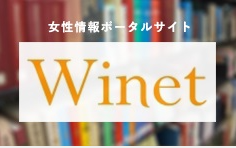Cooperation with JICA
- HOME
- International Cooperation
- Cooperation with JICA
- FY2022 Knowledge Co-Creation Program "Eradicating Sexual and Gender-Based Violence (SGBV)"
Cooperation with JICA
- Event Report
-
FY2022 Knowledge Co-Creation Program "Eradicating Sexual and Gender-Based Violence (SGBV)"
Date:November 1 to December 1, 2022
The National Women’s Education Center (NWEC) held Knowledge Co-Creation Program (KCCP) course entitled “Eradicating Sexual and Gender-Based Violence (SGBV)” from November 1 to December 1, 2022, commissioned by the Japan International Cooperation Agency (JICA). There were 16 participants representing governments and NGOs who are involved in SGBV measures. They work primarily in ministries related to women’s affairs and youth education, local governments, and civil society organizations in Botswana, the Democratic Republic of the Congo, Ethiopia, Kenya, Lesotho, Liberia, Malawi, Namibia, Palestine, Rwanda, Samoa, and South Sudan.
The program, held online, provided participants with an opportunity to learn from each other about how support should ideally be provided based on the survivor-centered approach. Program included SGBV policies and frameworks in Japan and other countries, as well as governmental and private sector initiatives. Based on lectures and discussions, the participants developed action plans to strengthen initiatives in their home countries, which they shared during the Final Presentation Session.
The curriculum consisted of On-demand Program, Preparation Session, Program Orientation and Keynote Speech, Inception Report Presentations, Lectures and Group Exercises, Action Plan Consultation, and the Final Presentation Session. Participants shared information on SGBV response systems in their respective countries, the current situation regarding victimization, and good practices by government and private organizations, and engaged in lively discussions.
During the 16 days following the International Day for the Elimination of Violence Against Women on November 25 through to World Human Rights Day on December 10, the United Nations and NGOs join together in a campaign under the slogan “Orange the World” in an effort to strengthen the movement toward the elimination of violence against women. During the program period, various awareness-raising events involving citizens in each country were shared.
 An event held in Malawi
An event held in Malawi
 An event held in Kenya
An event held in Kenya
 Participant at the National Men's Conference in Namibia
Participant at the National Men's Conference in Namibia
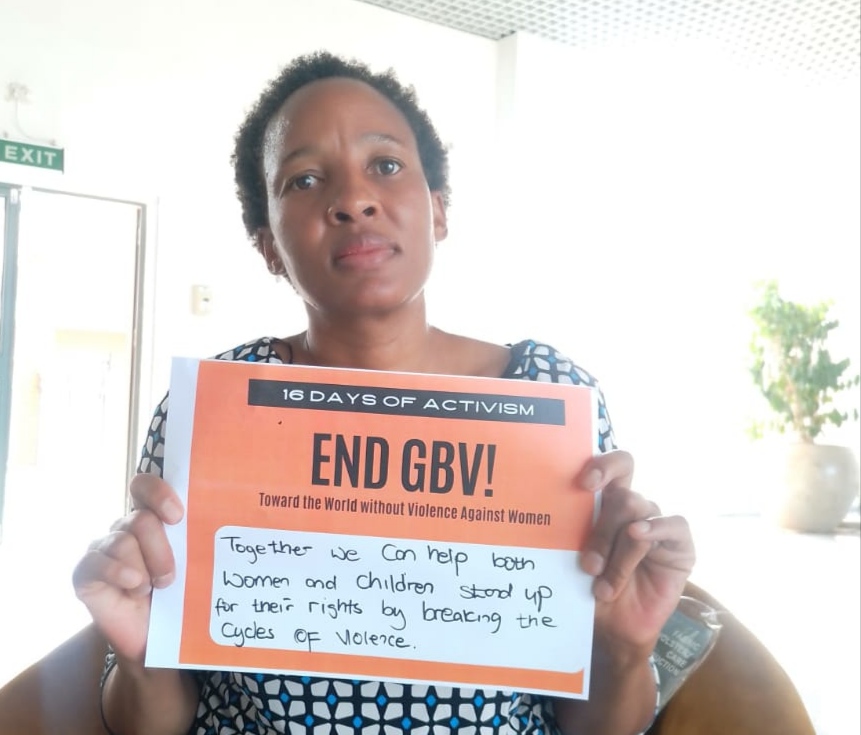 Message from Kenyan participant for the elimination of SGBV
Message from Kenyan participant for the elimination of SGBV
From Nov 1 (Tue): On-demand Program
Participants were able to learn about global SGBV issues and the efforts of JICA and related Japanese organizations to eliminate SGBV through resources such as the animated video produced by JICA entitled “Eliminating Gender-based Violence (GBV)” and a video featuring initiatives being taken in Japan, entitled “Towards Eliminating Gender Based Violence – Experience from Japan.”
Nov 14 (Mon): Orientation/Keynote Speech
As an online live orientation, 16 participants from 12 countries were connected via Zoom. The program began at 4:00 p.m. Japan time, but due to time differences, the participants were gathering across different time zones starting in the morning for Africa and Palestine, and at 8:00 p.m. for Samoa. The keynote speaker, Ms. Mikiko Otani, Chair of the United Nations Committee on the Rights of the Child, gave an interactive lecture on the definition of SGBV and how to change harmful practices. The participants affirmed that although patterns of violence may vary in each cultural context, there are patriarchal and unequal economic structures underlying this issue. The keynote speech also emphasized the importance of holistic and multidisciplinary collaboration and a survivor-centered approach.
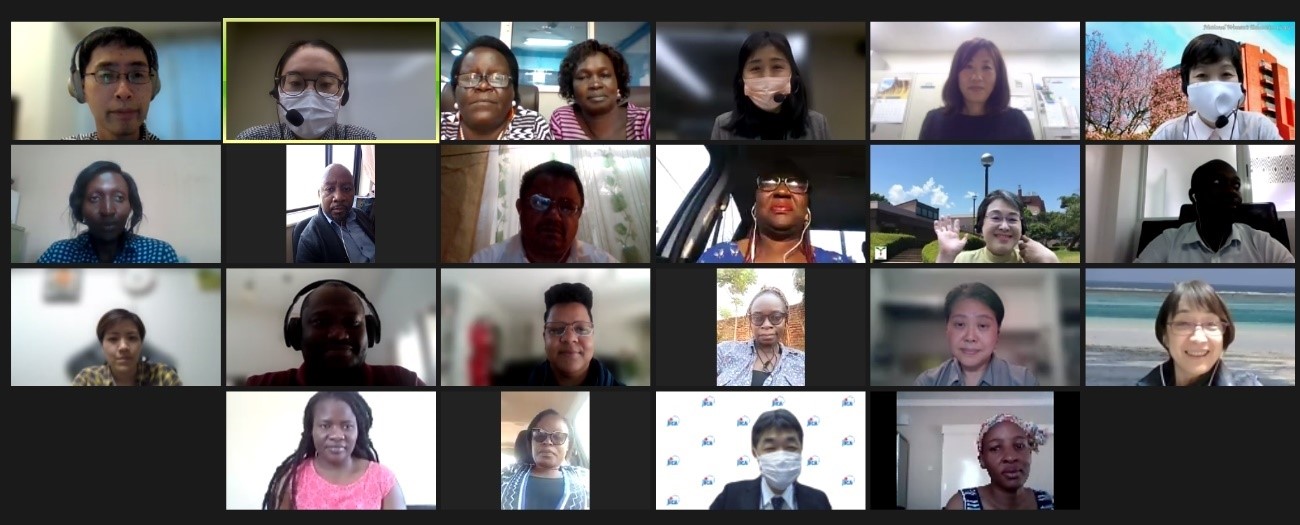
Nov 15 (Tue) and 16 (Wed): Inception Report Presentations
In the Inception Report Presentation, participants divided into two groups shared the situation in their respective countries. Although there has been progress in domestic legislation to eliminate SGBV in the countries participants represented, there are still deep-rooted harmful practices such as Female Genital Mutilation (FGM), child and forced marriage, and some situations where the family member settle the case financially out of court without the consent of the survivors.
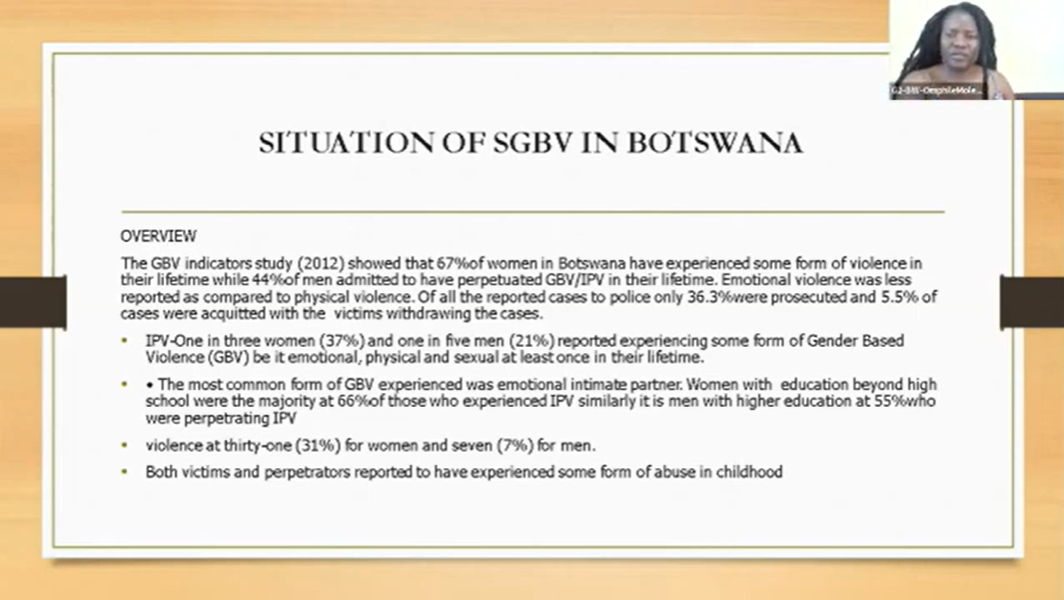
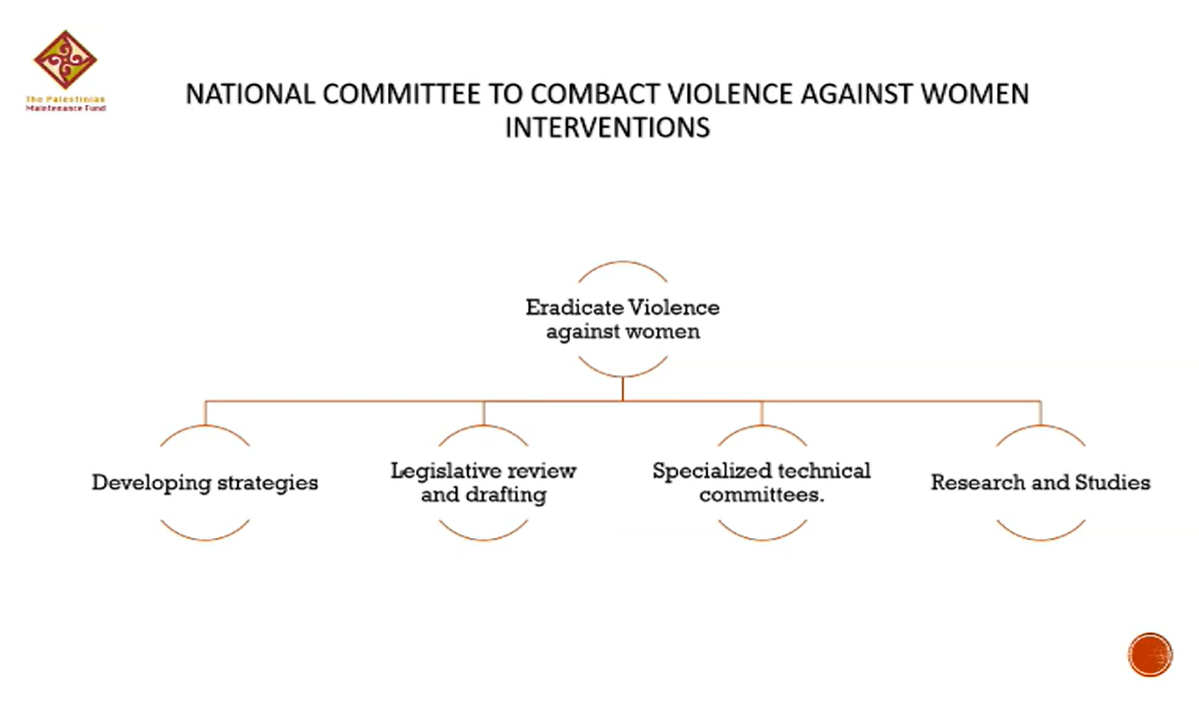
Nov 21 (Mon) to 24 (Thu): Lectures/Group Exercises
Initiatives and experiences from Japan were shared, including public-private partnerships, shelter support based on the victim’s perspective, and programs for offenders. A lecture held on November 21 focused on the functions and roles of the Tokyo Metropolitan Women’s Consultation Center, as well as on the topics of sexual violence and sexual harassment.
On November 22, a lecture was given regarding private shelters and cooperation between the public and private sectors. Japanese NPO Saya-Saya provides seamless support for women and children who are victims of domestic violence (DV) based on the slogan, “Survivor is the expert.” There was much interest in Saya-Saya’s programs to help women heal physically and mentally, to support their employment, and to raise awareness toward preventing DV.
On November 23, participants conducted an exercise to develop an action plan. Utilizing the “Project Cycle Management (PCM)” method, they focused on the core problem of “women who are victims of violence do not seek help” and analyzed background of the challenges and objectives in a group exercise.
On November 24, a lecture was given on efforts aimed at offenders and men in general. AWARE provides educational programs to assist victims by helping DV perpetrators to change their violent behavior and face up to their responsibility for the abuse. Although much of the SGBV support is rightfully directed at victims, participants were reminded of the importance of working with perpetrators over the long term in order to promote sustainable behavioral change.
Nov 28 (Mon) and 29 (Tue): Individual Consultation
On November 28 and 29, each participant was given 30 minutes for consultation regarding their individual action plan. Each participant analyzed the challenges and objectives around their core problem they have set and presented a draft action plan.
Nov 30 (Wed) and Dec 1 (Thu): Final Presentations
On November 30 and December 1, participants gave presentations on their action plans incorporating a survivor-centered approach and multi-agency collaboration, with such themes as “Efforts to eliminate SGBV against young women,” “Efforts to eliminate sexual harassment by fathers-in-law,” “Basic study towards shelter operation,” “Economic empowerment for women affected by SGBV,” “Creation of a comprehensive national SGBV database,” and so on. JICA’s Senior Advisor on Gender and Development made comments on action plans and possible future bilateral cooperation. By the end of the program, participants recognized that SGBV occurs not only in their own countries, but in countries all over the world, and voiced their wish to continue to collaborate and exchange information in tackling this global issue.
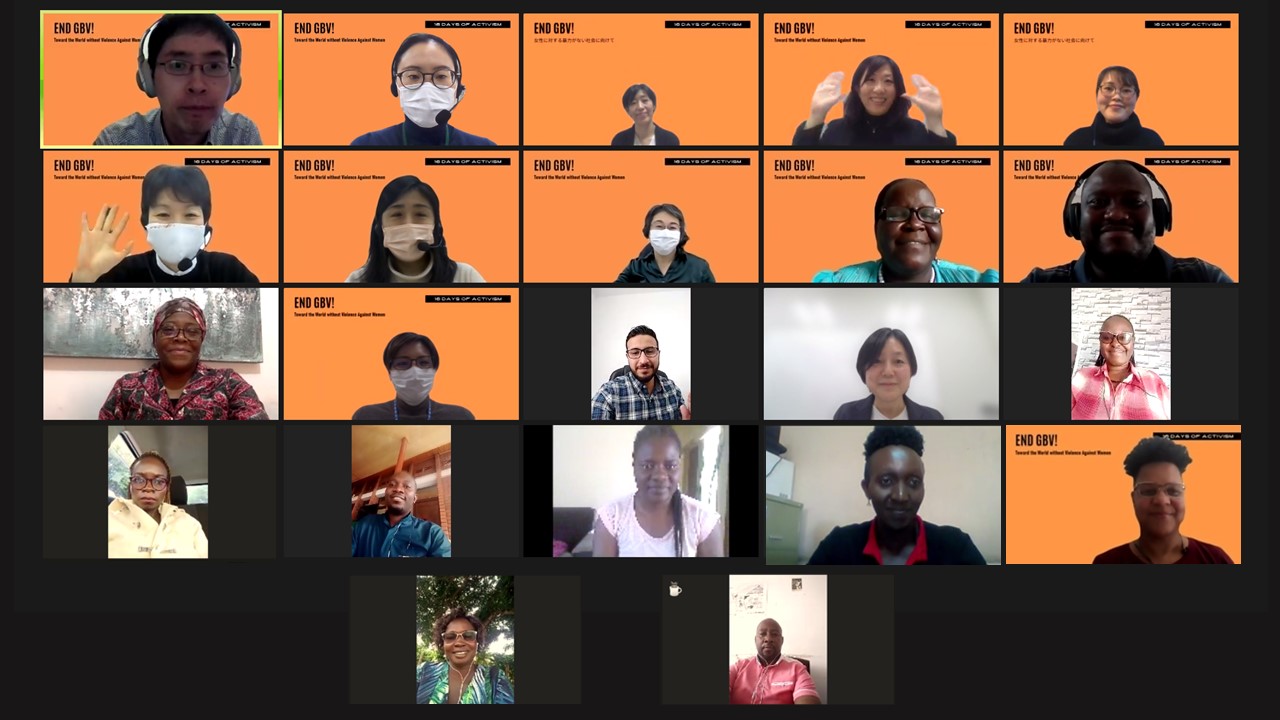
We would like to express our sincere appreciation to all those involved for their cooperation in putting this program together.
International Cooperation
- International Seminar
- FY2019 Seminar for Gender Equality Officers and Women Leaders in the Asia Region
- FY2018 Seminar for Gender Equality Officers and Women Leaders in the Asia Region
- FY2017 Seminar for Gender Equality Officers and Women Leaders in the Asia Region
- FY2016 Seminar for Gender Equality Officers and Women Leaders in the Asia Region
- FY2015 Seminar for Gender Equality Officers and Women Leaders in the Asia Pacific Region
- FY2014 Seminar for Gender Equality Officers and Women Leaders in the Asia Pacific Region
- FY2013 Seminar for Gender Equality Officers and Women Leaders in the Asia Pacific Region
- FY2012 Seminar for Gender Equality Officers and Women Leaders in the Asia Pacific Region
- FY2011 Seminar for Gender Equality Officer and Women Leaders in the Asia Pacific Region
- FY2010 Empowerment Seminar for Women Leaders in the Asia Pacific Region
- FY2009 Empowerment Seminar for Women Leaders in the Asia Pacific Region Final Report
- FY2008 Empowerment Seminar for Women Leaders in the Asia Pacific Region
- FY2007 Empowerment Seminar for Women Leaders in the Asia Pacific Region
- FY2006 Empowerment Seminar for Women Leaders in the Asia Pacific Region
- NWEC Global Seminar
- FY2025 NWEC Global Seminar: Addressing Technology-Facilitated Gender Based Violence (TFGBV): Approaches to Eradicate the Invisible Harm
- FY2024 NWEC Global Seminar: Gender Equality and Care
- FY2023 NWEC Global Seminar: Gender Mainstreaming & Strengthening Institutional Mechanism with Gender Perspective
- FY2022 NWEC Global Seminar: Does Digital Technology Advance Gender Equality?
- FY2021 NWEC Global Seminar: Combating Gender-Based Violence – “Building Back Better” from the Covid-19 Crisis
- FY2020 NWEC Global Seminar: Covid-19 and Gender
- FY2019 NWEC Global Seminar: Gender and Media
- FY2018 NWEC Global Seminar: Promotion of the Advancement of Women - What Japan can learn from Iceland about Gender Equality?
- FY2017 NWEC Global Seminar: Promotion for Advancement of Women Lessons from Germany
- FY2016 NWEC Global Seminar: Promotion for Advancement of Women –Lessons from Europe
- FY2015 International Symposium: Gender Equality and Women's Empowerment
- FY2014 International Symposium: Keys to Diversity and Women's Leadership
- FY2013 NWEC International Symposium:Gender Equality for Men
- FY2012 NWEC International Symposium:To Make a Society without Violence against Women a Reality
- FY2011 NWEC International Symposium
- FY2010 International Forum for Women's Empowerment
- FY2009 International Forum for Women's Empowerment
- FY2008 International Forum for Women's Empowerment Final Report3
- FY2008 International Forum for Women's Empowerment Final Report2
- FY2008 International Forum for Women's Empowerment Final Report1
- Cooperation with JICA
- FY2025 Knowledge Co-Creation Program (KCCP): "Promotion of Global Networking on Anti-Trafficking in Persons"
- FY2025 Knowledge Co-Creation Program "Eradicating Sexual and Gender-Based Violence (SGBV)"
- FY2025 Knowledge Co-Creation Program: Bangladesh “Strengthening Capacity to Address Gender-Based Violence"
- FY2024 Knowledge Co-Creation Program on "Promotion of Global Networking on Anti-Trafficking in Persons"
- FY2024 Knowledge Co-Creation Program "Eradicating Sexual and Gender-Based Violence (SGBV)"
- FY2023 Knowledge Co-creation Program "Promotion of Networking among ASEAN Countries on Anti-Trafficking in Persons”
- FY2023 Knowledge Co-Creation Program "Eradicating Sexual and Gender-Based Violence (SGBV)"
- FY2022 Knowledge Co-creation Program "Promotion of Networking among ASEAN Countries on Anti-Trafficking in Persons”
- FY2022 Knowledge Co-Creation Program "Eradicating Sexual and Gender-Based Violence (SGBV)"
- FY2021 Knowledge Co-creation Program "Promotion of Networking among ASEAN Countries on Anti-Trafficking in Persons”
- FY2020 Knowledge Co-creation Program "Promotion of Networking among ASEAN Countries on Anti-Trafficking in Persons”
- FY2019 Knowledge Co-creation Program "Promotion of Networking among ASEAN Countries on Anti-Trafficking in Persons”
- FY2018 Knowledge Co-creation Program "Promotion of Networking among ASEAN Countries on Anti-Trafficking in Persons”
- Issue-specific Training “Seminar on Promotiom of Networking among ASEAN Countries on Anti-Trafficking in Persons”
- Basic Information-Gathering Survey/Workshop Seminar on the Economic Independence for Women in Central America and the Caribbean (El Salvador/Dominican Republic)
- Regional Gender Seminar in Central and South America
- 2015 Issue-specific Training "Seminar on Promotion of Networking among Asian Countries on Anti-Trafficking in Persons"
- Seminar on the Promotion of Education for Girls and Women II
- International Conference/International Exchange
- Online meeting with Seisen International School elementary students
- Visitor: Mansfield Fellows
- Visitor:JICA Knowledge Co-Creation Program (KCCP) on "Women's Empowerment through Business for Central American Integration System (SICA) Member Countries"
- The 68th Session of the Commission on the Status of Women
- Visitor: Madam Sustjie Mbumba, First Lady of the Republic of Namibia
- Workshop of commemorating the donation of the Beate Shirota Gordon archive materials
- Meeting with Korean Women’s Development Institute (KWDI)
- The Coalition of Finnish Women's Associations (NYTKIS) Secretary General Ms. KAKKOLA’s Courtesy Call to Foreign Minister KAMIKAWA
- The Coalition of Finnish Women's Associations (NYTKIS) Secretary General Ms. KAKKOLA’s Japan Visit Program
- The 67th Session of the Commission on the Status of Women
- NGO CSW67 Forum
- Webinar with Korean Women’s Development Institute (KWDI)
- The 66th Session of the Commission on the Status of Women (Hybrid format)
- Online meeting with international graduate students from the Appropriate Technology course at the University of Tsukuba
- The 65th session of the Commission on the Status of Women
- Lecture "The Beate Sirota Gordon Archives at Mills College"
- Participation in 2nd AGenT
- The 64th session of the Commission on the Status of Women
- Dr. Wang from National Taiwan University visits NWEC
- Japan Network of Women Engineers and Scientists and The Japan Inter-Society Liaison Association Committee for Promoting Equal Participation of Men and Women in Science and Engineering: 9th Japan Korea China Women Leaders Forum for Science & Technology
- Researcher from the KWDI visits NWEC
- Visit by a delegation from the Socialist Republic of Vietnam Ministry of National Defense
- Briefing on the Reykjavik Index for Leadership
- Women's Archives Center Exhibition "Beate Sirota Gordon and gender equality in Japanese Constitution"
- Visit from the Guangxi Women’s Federation
- Participation in the 63rd Session of the Commission on the Status of Women
- 7th Global Forum on Gender Statistics
- FY2018 International Symposium hosted by Korean Institute for Gender Equality Promotion and Education “Gender Equality at Schools”
- Visit from All-China Women’s Federation(ACWF)
- Participation in the 62nd Session of the Commission on the Status of Women
- The 14th KIGEPE International Symposium “Empowering Women’s Leadership: expanding influence and innovation”
- Participation in the 61st Session of the Commission on the Status of Women
- Visit from the Batis Center for Women
- 2011 Asia Women Eco-Science Forum (a forum of science and engineering leaders in Japan, China and Korea)
- The 60th Session of the Commission on the Status of Women
- The 59th Session of the United Nations Commission on the Status of Women
- The 58th Commission on the Status of Women
- The 57th Session of the United Nations Commission on the Status of Women
- International Symposium: Gender Awareness Education for Sustainable Development
- Thirtieth Anniversary Programs
- Attendance at the Ceremony Commemorating the 25th Anniversary of the Korean Women’s Development Institute (KWDI)
- Japanese-Filipino children (JFC)* from the Philippines-based NGO “DAWN” visit the Center
- Visitors from Abroad to NWEC
- Research report on Multicultural Family Support in South Korea
- Workshop on Gender and Education: Life-long Learning for Women’s Empowerment
- Lecture Delivered by a Visiting Researcher
- Connections: Bringing Together the Next Generation of Women Leaders in Science, Technology, Engineering and Mathematics
- Conclusion of Memorandum of Understanding on Exchange and Cooperation with the Ministry of Women's Affairs, Royal Government of Cambodia
- Visit to Japan by the Minister of Women’s Affairs of the Royal Government of Cambodia
- KIGEPE Delegation Visit
- Officials of Ministry of Information and Communications of the Socialist Republic of Vietnam visited NWEC
- The 56th Commission on the Status of Women
- Dr. Barker's visit
- Multidisciplinary Intellectual Exchange for Women Leaders from the United States, Japan, South Korea and the Philippines
- Courtesy visit to University of Hawai`i
- Delegation of Board for the Advancement of Women, Ministry of Finance of the Socialist Republic of Vietnam visited NWEC
- Visit Korean Women's Development Institute (KWDI)
- Report on Participation in the 5th World Social Forum on Migration
- A group led by the Vice President of the Korean Women's Development Institute visited NWEC
- A disaster management specialist from India visits the Center
- Visit to the Korean Institute for Gender Equality Promotion & Education (KIGEPE) and others
- Secretary of State, Ministry of Justice, Kingdom of Cambodia visited NWEC
- Research conducted in the Republic of the Philippines
- Research on the Comparative Study of the Gender Equality Policy in Southeast Asian Countries in the Kingdom of Cambodia
- Ochanomizu University and A Canadian Women’s Study Researcher visited NWEC
- Aigyung Yang, Research Fellow and Former Director of Strategy Board for Women Friendly Policies of the Korean Women's Development Institute (KWDI) Visits NWEC
- Delegation of the Ministry of Defense of the Socialist Republic of Vietnam visited NWEC
- Delegation from the Women and Development Center, of the Vietnam Women's Union, Visited NWEC
- The "7th Asia-Pacific Forum on Development and Gender" was held in Seoul, South Korea
- HOME
- International Cooperation
- Cooperation with JICA
- Cooperation with JICA
- FY2022 Knowledge Co-Creation Program "Eradicating Sexual and Gender-Based Violence (SGBV)"

